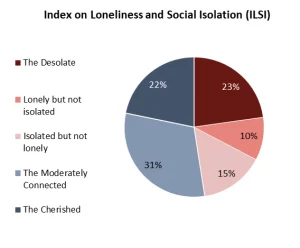Loneliness makes managing conflict even more difficult. Research shows that a lonely person may experience a shorter attention span, need longer time to process information, struggle to control emotions, want to avoid conflict, and experience feelings of worthlessness. As human beings we cannot get away from conflict. Here are four tips to help manage conflict for the lonely people we encounter, including ourselves.
The pandemic has brought loneliness out of the closet and made it the subject of increased research. A study by the Angus Reid Institute in 2019 described loneliness in this way.
Loneliness has been described as a mismatch between the quantity and quality of social relationships that a person has, compared with what a person wants. It is an unwelcome feeling of lacking companionship. One way to think about the distinction is that a person cannot be isolated in a crowded room, but a person could feel lonely in that same room.

As you can see on the graph of the study results, “Desolate” and “Lonely but not isolated” accounted for a whopping 33% even back in pre-pandemic 2019.
Another important finding was that visible minorities, Indigenous Canadians, those with mobility challenges, and LGBTQ2 individuals are all more likely to deal with social isolation and loneliness than the general population average.
Based on the work of Dr. Ami Rokach, loneliness has five 5 dimensions and occurs when at least two of the dimensions are experienced. (Rokach & Brock, 1988; Rokach, 2019)
- Emotional distress is the gnawing pain, hurt and anxiety, feeling as if our heart is breaking.
- Social inadequacy and alienation are experienced as the concern that we are not good enough for others to want our company, or we feel inadequate, ignored and not valued.
- Interpersonal isolation, marked by thinking that I am not loved by anyone, have no meaningful close or romantic relationship, and basically do not matter to anyone.
- Self-alienation focuses on experiencing my body as though it is separate from my mind – a kind of a defense mechanism to prevent me from feeling the searing pain of loneliness.
- Growth and discovery, address the growth-promoting effects that this experience may have, the ability to realize that we may have more resources to cope with a difficult situation than we thought, a new appreciation of others and of interpersonal relationships, and a clearer understanding of ourselves and our world.
Several researchers have identified ways that loneliness alters brain function, especially executive functioning of the brain, such as the capacity to control attention, cognition, and emotion or behaviour to be able to meet social standards or personal goals. This means that the lonely person’s brain changes how they understand themself and others, and impairs their engagement with their environment.
Loneliness plays an instrumental role in mood, anger, anxiety, optimism, self-esteem and related states. (Cacioppo J. T., et al., 2006) Because their self-protective and self-defeating interactions with others cause lonely people to feel insecure and sensitive to threats and rejection, they may view themselves as passive victims even though they are active contributors in interpersonal interactions.
Whether we are conflict resolution professionals or not, all of us will encounter more lonely people in this post-pandemic era. How can I manage conflict effectively with a lonely person? Even if that lonely person is myself?
- Be curious. Ask questions to identify where the person is within the 5 dimensions of loneliness.
- Be calm. Structure your interaction with the person so as to allow them to de-escalate their emotions and feel psychologically ready to consider the conflict.
- Be patient. It may take more time to build the necessary foundation for the lonely person to engage with the conflict.
- Repeat. Because they may be experiencing altered brain function which affects their perception of social situations, it may take time for the lonely person to appreciate the various aspects of the conflict situation as perceived by the others involved.
This blog post was inspired by an article in ADR Update, Summer 2021, the newsletter for members of the ADR Institute of Ontario. “ How Loneliness May Influence Conflict Response” by Penny Van Den Berg
Struggling with conflict?
Want to build your mediation skills?
Register for our first-level course Fundamentals of Mediation at Munn Conflict Resolution Services starting on June 15, 2022.
*ONLINE – LIVE STREAMED*
Fundamentals of Mediation – Live- streaming next on June 15, 16, 17, 20, and 21, 2022
Early registration discount ends May 13, 2022!
5 days – 40 hours.
Recognized by
- the ADR Institute of Ontario
- the Law Society of Ontario
Click here for full details about our Mediator Education Program.
